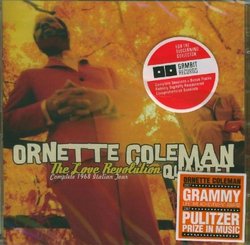4.5/5 star performance, 2 star sound.
Michael Stack | North Chelmsford, MA USA | 02/27/2006
(3 out of 5 stars)
""The Love Revolution" collects two performances from Ornette Coleman's quartet's Europeean tour in early 1968-- during this period, Coleman performed with a two-bass quartet including Charlie Haden and David Izenzon (both bassists) and drummer Ed Blackwell. This group is pretty much undocumented-- only a pair of spotty bootlegs surfaced. Those two are what "The Love Revolution" is-- live shows from Rome (February 8, 1968) and Milan (February 5). The sound is somewhat improved (although quite frankly, it still sounds like bootleg recordings), but it's really the performance that's the goal with these.
The Rome show is sonically the superior of the two-- it's clean with a relatively even balance, although the basses sometimes get a bit muddle and indistinct. My guess is it's a poorly recorded radio broadcast. Four titles are performed, the first two ("Lonely Woman" and "Monsieur le Prince") with Coleman on alto, "Forgotten Children" finds the leader on trumpet and "Buddha Blues" puts him on shenai, a Middle Eastern reed. The latter is most intriguing as I can't think of a single issued recording featuring Coleman on the instrument, which seems to inspire him to a frantic improv, pushed forth by a simply fantastic arco counterpoint from one bass over a fiercely swinging rhythm. "Forgotten Children" feels related to "Just For You" and ends up with a laid-back theme and a more aggressive improvisation from the leader, whose rather unique trumpet technique is on display. The two tracks with Coleman on alto though are the real gems on this disc-- "Lonely Woman", taken an octave lower than the classic recording on "The Shape of Jazz to Come", is energetic and powerful, with Coleman performing brilliantly over a delicate wash of support from the basses. "Monsieur le Prince" is a bouncey, chirping theme and proves to be essentially an alto feature in the form of any number of up-tempo Coleman compositions.
The second disc, recorded at the Teatro Lirico in Milan, is quite a bit less appealing from a sonic standpoint. This has all the clear hallmarks of an audience recording-- that fuzzy theater sound to it, although the audience seems to be dead silent, which leads me to wonder whether the source was not a poorly dubbed broadcast. Three pieces, all of which The opener, "Tutti", a piece that I (and for that matter Jamaaladeen Tacuma) have always thought of as "Dancing in Your Head" (due to its prominent placement on that album) gets an extended (23 minute) reading, with Coleman ecstatically stating the theme and then entering into an extended solo of enormous inventiveness. But trumping him is a bass dialog where one bassist seems to enter in theme variation and the other responds to him. "Three Wisemen and the Saint" is a bluesy, explosive piece, with Coleman digging deep and pulling out all the stops in the sort of improvisation that is usually associated with free jazz, frantic energy, upper register expositions and even occasional overblows make their way into his performance. This kind of performance is somewhat unusual for Coleman and is really intriguing to hear. The closer, "New York", is a slow blues, Coleman plays a brief solo before turning over to an arco solo that is just absolutely lovely and lush, and quite frankly worth the cost of the entire set.
The performances on these CDs is fantastic, but it is important to note these are repackaged (and perhaps still) bootlegs. Sonically, this is not anywhere near a professional sounding recording. If you can deal with that, these are fine shows to have, otherwise save this for the hardcore collectors."
Ornette's best?!?! I think so.
Pen Name? | 10/18/2006
(5 out of 5 stars)
"Absolutely stunning and brilliant. the concert on disc 1 is a ridiculously good sound recording and a mesmerizing performance from start to finish. To my ears it's the most exciting jazz recording I've ever heard. The second disc only pales in comparisson. The sound on that one is more muddled, but still good for a live recording and the music is stellar.
Esp. for one who had never heard Ornette's music from this era ('68) apparently I'd been missing his most vibrant music. I didn't think it was possible!
If you haven't heard this yet, you need to. that's all I can tell you, it's incredible."


 Track Listings (4) - Disc #1
Track Listings (4) - Disc #1